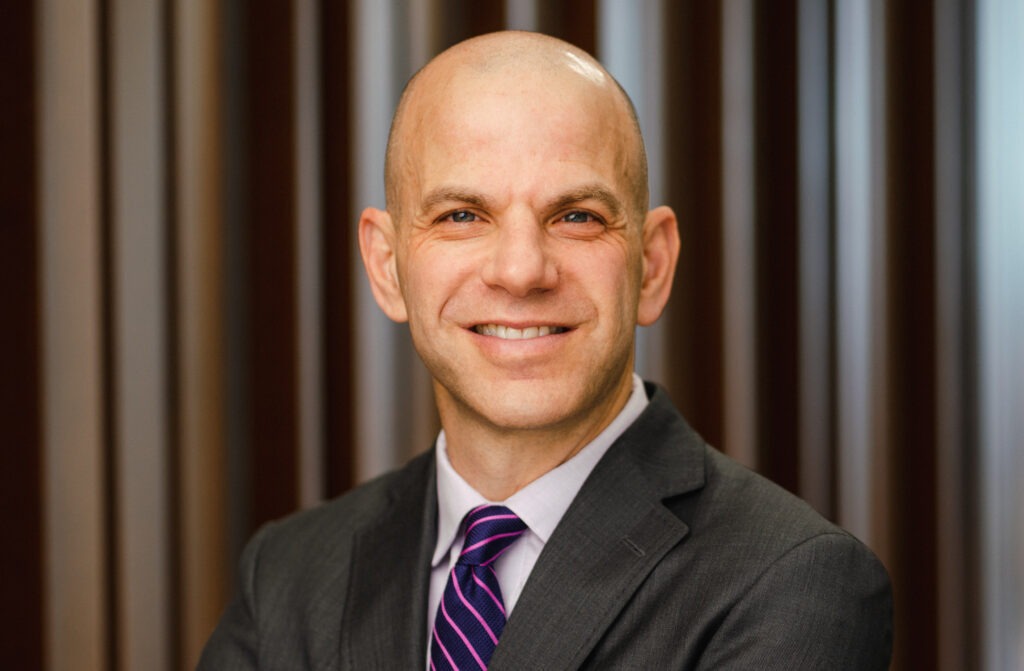A few minutes before 10 a.m., students silently file into Professor Clifford Rosky’s classroom. They set down their bags and backpacks without pulling out their laptops, tablets, phones, or even pens and notebooks. The chatter that fills the classroom disappears. No one says a word.
Promptly at 10, Rosky begins guiding the class in a 20-minute meditation. After they meditate, students discuss the thoughts, feelings, and sensations that came up for each of them.
And, yes, this is a law school class.
Rosky has been a professor at the S.J. Quinney College of Law since 2008, teaching more traditional law school courses like constitutional and criminal law, as well as courses covering topics like equality, gender, and sexuality.
A mindfulness practitioner himself, Rosky wanted to help students learn techniques that had been useful to him. So he received a grant to attend the Mindful Awareness Research Center at UCLA, earning a certification as a mindfulness facilitator, and prepared a pilot version of a new mindfulness course.
A different kind of class
The result was Mindful Lawyering, first offered in the spring of 2019 to about 15 students. Since then, the course has been offered once every year as a pass/fail course. Students are assigned readings and writing assignments, but the daily meditation assignment is the most important component. Each class ends with students conducting small group exercises in which they practice mindfully observing, speaking, and listening to each other. The course is capped at 40 participants and consistently fills.
“I did not expect [the course] to be this popular,” says Rosky. Although he believes some students register mainly to explore soft skills that can be used as lawyers, “quite a few come [because they are] suffering.”
Even in pandemic, mindfulness works
Beside its popularity with students, Mindful Lawyering holds another distinction. “To date, this is the only course in our law school whose efficacy has been tested in a peer-reviewed journal,” Rosky notes.
Rosky had seen anecdotally the positive effects of mindfulness practice among his students and wanted to study them further. He teamed up with Eric Garland, a Distinguished Endowed Chair in Research at the University of Utah College of Social Work and a “rock star of mindfulness research.”
Garland helped Rosky design a study to measure the impact of mindfulness practices among law students, which began with the spring 2020 course. Of course, no one could have predicted that by the middle of the semester, students would have experienced the metaphorical seismic shift of the pandemic—or the actual seismic shift of a 5.7 magnitude earthquake that hit Salt Lake City March 18.
At that time, Rosky thought the pandemic would derail any positive well-being outcomes of the mindfulness practices his students were learning. “We're measuring stress, anxiety, depression, negative mood, positive mood, alcohol abuse. There's no way that my students would be any better off after the pandemic than they were before it,” Rosky remembers thinking. “I thought, … ‘Well, maybe we'll notice a smaller drop in well-being among the students in my class—that mindfulness was sort of a cushion.”
With his expectations tempered, Rosky was shocked when Garland and study co-authors Lynae Roberts and Adam Hanley revealed the study results. His students hadn’t just maintained their well-being—they had shown significant improvements in every measure of well-being the study tested.
“Mindful Lawyering: a Pilot Study on Mindfulness Training for Law Students,” co-authored by Rosky, Garland, Roberts, and Hanley, was published in August 2022.
The study compared well-being outcomes between 31 students in the Mindful Lawyering course and a comparison group of 31 other Utah Law students. “On average, the mindfulness group had significantly greater reduction in stress, anxiety, and depression symptoms than the comparison group,” the report stated. Rosky’s students also had “significantly greater reductions in alcohol misuse behaviors.”
“At the time, liquor stores were selling out, and we're measuring disordered alcohol use … and in fact, there was a significant improvement among the students in my class on those outcomes,” he recalls.
“You’re not the only one.”
Rosky’s own mindfulness journey began during another traumatic period, when he was a student at Yale Law School in 2001 after the 9/11 attacks. He tried meditation for the first time when Yale offered students the opportunity to participate free of charge in a mindfulness retreat. “I’ve had my well-being issues in my life,” he notes, including generalized anxiety, attention deficit disorder and bipolar diagnoses, and liver cancer. “I definitely have turned to and turned back to meditation to support my mental health.”
At the beginning of each semester, Rosky tells his students they can discuss even—and especially—the difficult and unpleasant thoughts that arise. When students begin to share, his message to them is advice that many lawyers can use: “You’re not the only one. No one is the only one.”
